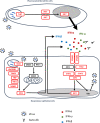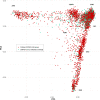Rare predicted loss-of-function variants of type I IFN immunity genes are associated with life-threatening COVID-19
- PMID: 37020259
- PMCID: PMC10074346
- DOI: 10.1186/s13073-023-01173-8
Rare predicted loss-of-function variants of type I IFN immunity genes are associated with life-threatening COVID-19
Erratum in
-
Correction: Rare predicted loss-of-function variants of type I IFN immunity genes are associated with life-threatening COVID-19.Genome Med. 2024 Jan 6;16(1):6. doi: 10.1186/s13073-023-01278-0. Genome Med. 2024. PMID: 38184654 Free PMC article. No abstract available.
Abstract
Background: We previously reported that impaired type I IFN activity, due to inborn errors of TLR3- and TLR7-dependent type I interferon (IFN) immunity or to autoantibodies against type I IFN, account for 15-20% of cases of life-threatening COVID-19 in unvaccinated patients. Therefore, the determinants of life-threatening COVID-19 remain to be identified in ~ 80% of cases.
Methods: We report here a genome-wide rare variant burden association analysis in 3269 unvaccinated patients with life-threatening COVID-19, and 1373 unvaccinated SARS-CoV-2-infected individuals without pneumonia. Among the 928 patients tested for autoantibodies against type I IFN, a quarter (234) were positive and were excluded.
Results: No gene reached genome-wide significance. Under a recessive model, the most significant gene with at-risk variants was TLR7, with an OR of 27.68 (95%CI 1.5-528.7, P = 1.1 × 10-4) for biochemically loss-of-function (bLOF) variants. We replicated the enrichment in rare predicted LOF (pLOF) variants at 13 influenza susceptibility loci involved in TLR3-dependent type I IFN immunity (OR = 3.70[95%CI 1.3-8.2], P = 2.1 × 10-4). This enrichment was further strengthened by (1) adding the recently reported TYK2 and TLR7 COVID-19 loci, particularly under a recessive model (OR = 19.65[95%CI 2.1-2635.4], P = 3.4 × 10-3), and (2) considering as pLOF branchpoint variants with potentially strong impacts on splicing among the 15 loci (OR = 4.40[9%CI 2.3-8.4], P = 7.7 × 10-8). Finally, the patients with pLOF/bLOF variants at these 15 loci were significantly younger (mean age [SD] = 43.3 [20.3] years) than the other patients (56.0 [17.3] years; P = 1.68 × 10-5).
Conclusions: Rare variants of TLR3- and TLR7-dependent type I IFN immunity genes can underlie life-threatening COVID-19, particularly with recessive inheritance, in patients under 60 years old.
Trial registration: ClinicalTrials.gov NCT04262921 NCT04259892 NCT04352348.
Keywords: COVID-19; Immunity; Rare variants; Type I interferon.
© 2023. The Author(s).
Conflict of interest statement
RN and AKK are employees of Invitae and hold equities in the company. RPL is a member of the board of directors of Roche and its subsidiary Genentech. I Meyts holds a chair in Primary Immunodeficiencies and receives research grant from CSL Behring, paid to KUL. JLC reported a patent to PCT/US2021/042741 pending. FT is head of the Centre de Pharmacoépidémiologie (Cephepi) of the Assistance Publique – Hôpitaux de Paris and of the Clinical Research Unit of Pitié-Salpêtrière hospital, both these structures have received unrestricted research funding and grants for the research projects handled and fees for consultant activities from a large number of pharmaceutical companies, that have contributed indiscriminately to the salaries of its employees. FT is not employed by these structures and did not receive any personal remuneration from these companies. The remaining authors declare that they have no competing interests.
Figures



Update of
-
Rare predicted loss-of-function variants of type I IFN immunity genes are associated with life-threatening COVID-19.medRxiv [Preprint]. 2022 Oct 25:2022.10.22.22281221. doi: 10.1101/2022.10.22.22281221. medRxiv. 2022. Update in: Genome Med. 2023 Apr 5;15(1):22. doi: 10.1186/s13073-023-01173-8. PMID: 36324795 Free PMC article. Updated. Preprint.
References
-
- Bennett TD, Moffitt RA, Hajagos JG, Amor B, Anand A, Bissell MM, et al. Clinical characterization and prediction of clinical severity of SARS-CoV-2 infection among US adults using data from the US National COVID Cohort Collaborative. JAMA Netw Open. 2021;4:e2116901. doi: 10.1001/jamanetworkopen.2021.16901. - DOI - PMC - PubMed
Publication types
MeSH terms
Substances
Associated data
Grants and funding
LinkOut - more resources
Full Text Sources
Medical
Molecular Biology Databases
Miscellaneous

